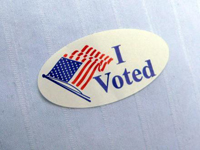Finding info on candidates harder than it should be

Many Oklahoma candidates running for office don’t set a good standard when it comes to providing information to voters.
An analysis by the Pioneer shows that many candidates don’t provide specifics on their websites, often containing only safe statements on vague topics.
In smaller races, many candidates use more traditional campaign methods such as door-to-door interactions and direct mail to provide information to voters. Still, many voters including 18 to 35-year-olds rely on the internet for political information.
“This is probably true for all the candidates websites, at least the vast majority that you go to, that you see these broad, vague about ideals and components with a fairly insufficient amount of detail,” said Collin Walke, a Democratic candidate for House District 87 in central Oklahoma City.
Walke, like many other candidates in the Sooner State, doesn’t provide an email or phone contact on his website, but instead has a “Get Involved” tab, which emails him directly and a Facebook page where people can message him.
“People, we have found, don’t usually dig into the details. If they want to find out more about you, they’ll call you or email you,” he said.
Walke isn’t the only one. Oklahoma Senate and House websites do not have information on incumbents that aren’t running for reelection, or candidates who are running for the House or Senate.
Experts say there is no wonder why there is a disconnect between voters and their local districts. Oklahoma City Community College political science professor Sharon Vaughan said political information is sparse is mainly due to a candidate’s efforts to appeal to largest number of people possible.
“The less details you have, the less you are going to make someone not vote for you,” she said. “They appeal to these broad slogans like ‘Make America Great Again’. What does that mean? Most Americans are so disengaged in the political system that they wouldn’t even know what policies to look for. We have a high level of political illiteracy.”
Because Oklahoma currently has a Republican-controlled state government, that party controls the House, the Senate, and the Governorship. This fall, voters will determine whether that trifecta will remain, with 18 seats in the state Senate and 71 seats in the state House of Representatives on the ballot.
In Oklahoma City, Walke, the Democratic candidate, faces Republican Candidate Bruce Lee Smith and Libertarian Candidate Elle Collins.
Smith, like Walke, does not provide a direct ‘contact me’ page on their personal websites. Libertarian Candidate Elle Collins runs her campaign through a Facebook page.
Smith’s platform page is three paragraphs long. There are no plans, no explanations, and no specific information on what he’ll do if elected for District 87. His argument is that voters can only choose “by comparing what he or she has done in their lives.”
“I know how to work with others to get things done and how to make government more efficient,” a posting on Smith’s website says. Terms like “things” or “efficient” don’t explain “how” and give little room to understand what it takes to make a difference in the district.
Smith said he wrote the platform page personally. “From what I understand, the website is just more general information about the candidate, so that’s what I stuck with,” he said. “When I talk to individuals at their door and stuff, I answer specific questions that they ask me. The mailing cards I send out are more specific with stuff like that.”
He acknowledges that some of his information is vague.
“When you’re running for office you’re essentially trying to get votes, and people can say anything to get a vote,” Smith said. “This is an open seat and you have candidates that have never held office, so all you can go by is the history of the candidate. The rest is just rhetoric and talk.”
Walke’s website also has language that is vague and open ended. However, other pages within the website offer more specific information, categorized as education, veterans, infrastructure, and mental health.
Walke told the Pioneer he approved the edits on his “issues” page once he decided to run for office. He fought for the District 87 spot in 2014 and lost. Walke said state representatives “wield a bully pulpit” to speak out on issues that constituents have or need, but there is definitely a pattern for most candidates in leaving their stance on things and platforms vague.
“None of them provide sufficient detail in large part because, what part of education is important to each constituent? It’s something that I can’t address without writing a book,” he said.
Earlier this year, Walke switched campaign teams from the primary to general elections and lost his official Twitter account with it. The missing contact page was an oversight, he said, that came with the switch in website and lack of website construction know-how.
Libertarian candidate Elle Collins uses Facebook to promote her campaign; however the most recent post is dated July 8, 2016.
In a press release issued on Collins’ page, published on July 3, she described herself as being “ready to address such issues as education funding, legalizing cannabis, marriage and religious equality.”
Collins told the Pioneer that she only use Facebook for the campaign, as a website would feel redundant.
“I chose to use social media as my primary mode of communication,” she said. My husband Lukus and I wrote it together. He ran the 2012 OK grassroots campaign for Ron Paul, so I asked for his help.”
None of the candidates in District 87 provide an easy, transparent manner of contacting them using websites or Facebook. Additionally, Oklahoma state government websites do not have a streamlined way to see the past, present, and potential future of my district representatives. However, other websites such as Ballotpedia, the Oklahoma Election Board, or the Oklahoma Ethics Commission do have information about candidates seeking office and the candidates’ fundraising efforts.